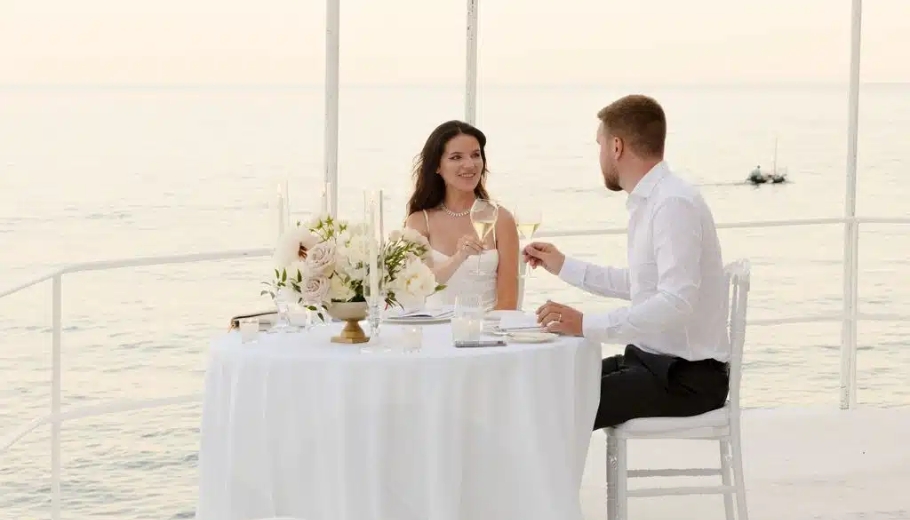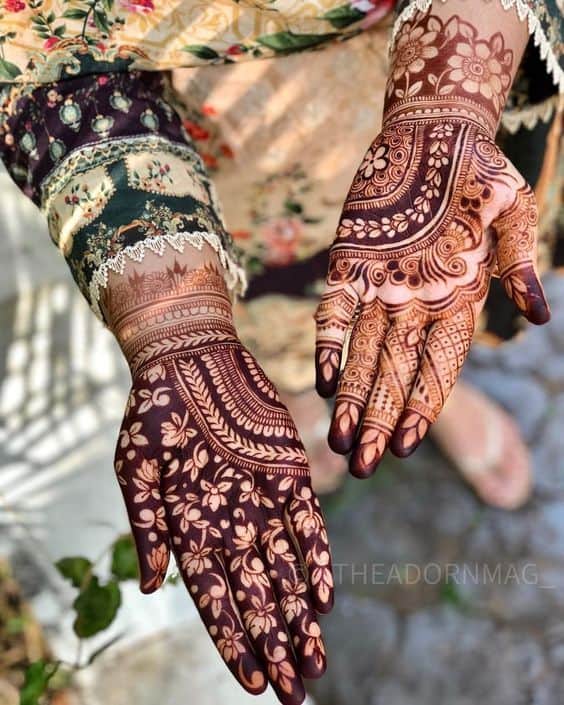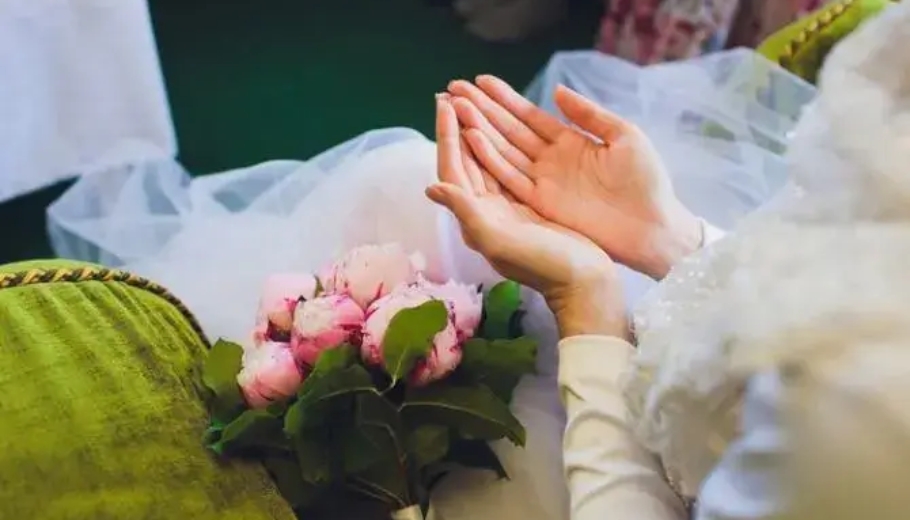Decoding ‘I Do’: Navigating the Maze of Elopement vs Wedding
Woohoo, you’re officially engaged! Now comes the exciting part: planning your special day. But with so many options and terms floating around—elopement, micro-wedding, traditional wedding, destination wedding—how do you decide what’s right for you? Don’t worry; we’re here to shed some light on one of the biggest dilemmas: planning an elopement vs a wedding.
To answer that, you have to decide whether you dream of a grand celebration surrounded by family and friends or if the idea of an intimate affair with just you and your partner sounds like pure bliss.
Let’s unravel the mystery together so you can start envisioning the perfect way to say “I do.”
What Is An Elopement?
Before tackling the question of elopement vs a wedding, it’s essential to understand the definition of each one…and the differences that go along with them. So, let’s start with what an elopement is.
When it comes to tying the knot, the definitions of elopement and wedding can vary depending on who you ask. In essence, elopement is a deliberate and intimate way to exchange vows, emphasizing celebrating your unique relationship in a way that feels authentic to you both. Elopement ceremonies offer boundless possibilities—you have the freedom to choose where and how you tie the knot and who attends. The elopement meaning is different for everyone, making it a unique and beautiful experience.
Conversely, a wedding typically follows a more structured format, with a larger gathering of family and friends at a designated venue. While it’s still a celebration of your commitment to each other, weddings often revolve around the comfort and expectations of your guests and the incorporation of time-honoured traditions.
Ultimately, the result is the same whether you opt for eloping vs. a wedding: you declare your lifelong commitment to one another. However, the overall experience, journey, and focus of the day sets weddings and elopements apart, making each one a uniquely beautiful celebration of love.
History Of Elopements
The history of elopements is as varied as the couples who choose to embark on them. Historically, elopements were often associated with couples who defied societal norms or family expectations to marry in secret. In many cases, elopements were a means for couples to bypass legal or religious obstacles to their union, such as parental disapproval, class differences, or laws restricting who could marry whom.
In centuries past, elopements were often seen as scandalous or rebellious acts, mainly if they involved young lovers defying their parents’ wishes. These clandestine marriages were sometimes hastily arranged and conducted in secret, often with the help of a sympathetic clergy member or a justice of the peace.
However, elopements haven’t always been viewed negatively. In some cultures and time periods, they were accepted or even celebrated as a romantic gesture of love and commitment. For example, during the Regency era in England, elopements became popularized in romantic literature and were often depicted as daring adventures undertaken by passionate couples.
In modern times, elopements have evolved to encompass various motivations and circumstances. While some couples still choose to elope as a way to rebel against tradition or familial expectations, others opt for an intimate ceremony as a reflection of their values, desire for privacy, or preference for simplicity. Elopements today can be as elaborate or low-key as the couple desires, and they often emphasize the importance of the couple’s love and commitment above all else.

Eloping Vs Wedding: The Differences
As we delve deeper into the captivating realm of weddings versus elopements, let’s shine a spotlight on the key differences between these two enchanting paths to saying “I do.” While both journeys culminate in the union of two souls, the approach and atmosphere of an elopement differ significantly from that of a traditional wedding. So, let’s explore the difference between elopement and weddings.
Should I Elope Or Have A Wedding?
Pros of Eloping
Less Stress
Elopements offer a blissful escape from the hustle and bustle of traditional wedding planning. With fewer moving parts and less pressure to meet societal expectations, couples can enjoy a more relaxed and stress-free journey to the altar.
Takes Less Time to Plan
Elopements offer a streamlined planning process compared to traditional weddings, allowing couples to exchange vows in a fraction of the time. With fewer moving parts and less emphasis on elaborate details, elopements can be planned relatively quickly, making them an ideal choice for couples who prefer a more spontaneous or efficient approach to tying the knot.
More Cost-Effective
Say goodbye to extravagant budgets and hello to financial freedom! Elopements typically come with a smaller price tag than traditional weddings, allowing couples to allocate their resources toward what truly matters: their love and future together.
All-Inclusive Package Options
Many elopement packages offer convenient, all-in-one solutions that streamline the planning process. From officiants to photographers and everything in between, these packages make it easy for couples to create their dream ceremony without the hassle of piecing together individual vendors.
Non-Traditional Experience
Dare to be different with an elopement that breaks free from the confines of tradition. Whether you’re exchanging vows atop a mountain peak or beneath a canopy of stars, elopements offer endless opportunities for adventure and exploration.
More Intimate
Elopements provide the perfect setting for couples to share an intimate moment away from the distractions of a larger crowd. It’s a chance to savour each other’s company and bask in the warmth of your love without any outside interference.
‘Just Us’ Experience
Escape the noise and distractions of the world and revel in a “just us” experience that’s entirely focused on your unique bond. Elopements allow couples to cherish the moment without the pressure of entertaining guests or adhering to a schedule.
More Wedding Ceremony Location Options
From secluded beaches to majestic forests, the world is your oyster when choosing a location for your elopement ceremony. With endless possibilities, you can select a setting that speaks to your heart and creates lasting memories.
100% Focused on Your Relationship
Elopements provide a sacred space for couples to reaffirm their commitment to each other without any outside distractions. It’s a chance to celebrate your love in its purest form and deepen the bond that brought you together in the first place.
Safe Place to Be Yourselves
Elopements offer a sanctuary where couples can let down their guard and authentically express themselves without fear of judgment. It’s a safe and nurturing environment where love can blossom freely.
No Outside Input/Opinions
Bid farewell to unsolicited advice and conflicting opinions. Elopements empower couples to make decisions that resonate with their hearts and values, free from external pressures.
No Strict Timelines or Schedule
Unlike traditional weddings, which often adhere to a tight schedule of events, elopements offer the freedom to go with the flow and embrace spontaneity. Whether you want to linger in a picturesque spot to watch the sunset or share a quiet moment under a blanket of stars, elopements allow you to savour each precious moment without time constraints. It’s a chance to relish in the beauty of the present and create memories that unfold naturally without feeling rushed or constrained by a rigid itinerary.
Undecided on where to get married in Italy? Here are the best destinations
Cons of Eloping
While elopements offer many advantages, it’s essential to consider some potential drawbacks before taking the plunge:
Limited Guest List
Elopements typically involve only the couple and a small handful of witnesses, which means that many loved ones may not be able to share in the joy of your special day. For some couples, the thought of excluding family and friends from such a momentous occasion can be a source of sadness or regret.
Lack of Traditional Wedding Experience
If you’ve always dreamed of walking down the aisle in a white gown or sharing a first dance surrounded by loved ones, eloping may not fulfill those traditional wedding expectations. For couples who value these time-honoured customs and rituals, eloping may feel like missing out on essential elements of the wedding experience.
Potential Hurt Feelings
Opting to elope without the presence of family and friends can sometimes lead to hurt feelings or strained relationships. While eloping is a personal decision, it’s essential to consider how your loved ones may react and communicate openly with them about your choice.
Less Formal Celebration
Without the pomp and circumstance of a traditional wedding, some couples may feel that their elopement lacks the grandeur or significance they desire. While elopements can be deeply meaningful in their simplicity, they may not provide the same sense of celebration or validation as a larger wedding ceremony.
Limited Vendor Options
Depending on the location of your elopement, you may have fewer options when selecting vendors such as photographers, florists, and officiants. This can make it challenging to find the perfect professionals to help bring your vision to life, particularly if you’re eloping in a remote or unfamiliar area.
In this case, no problem! At VB Events we are ready to take on any challenge that arises, doing the most stressful work for you 🙂
Legal and Logistical Considerations
Elopements often require careful planning to ensure that all legal requirements are met, particularly if you’re marrying in a different location or country. From obtaining marriage licenses to coordinating travel logistics, eloping can involve additional paperwork and stress compared to a traditional wedding ceremony.
GET IN TOUCH
Ready to plan your Luxury
Wedding in Italy?
Should You Host A Wedding vs an Elopement
As we continue our exploration of weddings versus elopements, let’s shift our focus to the advantages and drawbacks of hosting a traditional wedding compared to opting for an elopement. While both options offer their unique charms, it’s important to weigh the pros and cons to determine which style of celebration best suits your preferences, values, and vision for your special day.
Pros of a Wedding
Inclusive Celebration
Hosting a wedding allows you to share your joyous occasion with a larger group of family and friends. It’s a chance to gather your nearest and dearest for a memorable celebration of love and commitment, surrounded by the people who mean the most to you.
It’s All About You
It’s a chance to showcase your unique relationship and create a celebration embodying who you are as a couple. From the decor and music to the menu and overall ambiance, weddings allow you to infuse every aspect of the day with your personal touch, ensuring that it reflects your love and commitment.
Traditional Rituals and Customs
Weddings provide an opportunity to embrace time-honoured traditions and rituals that have been passed down through generations. From exchanging vows in a church to tossing the bouquet and cutting the cake, weddings offer a chance to partake in cherished customs that add depth and meaning to your ceremony.
Grandeur and Spectacle
For couples who dream of a lavish affair filled with grandeur and spectacle, weddings offer the perfect opportunity to go all out. From luxurious venues and extravagant decor to elaborate attire and gourmet cuisine, weddings provide a stage for couples to create a truly unforgettable experience for themselves and their guests.
Family Involvement
Planning a wedding often involves input and assistance from family members, which can strengthen bonds and create lasting memories. From helping with DIY projects to offering words of wisdom and support, involving loved ones in the wedding planning process can be a meaningful and rewarding experience.
More Extensive Vendor Options
With a traditional wedding, couples can access a broader range of vendors and services to help bring their vision to life. From florists and caterers to musicians and photographers, weddings offer endless possibilities for creating a personalized and memorable event tailored to your tastes and preferences.
Cons of a Wedding
Higher Cost
Weddings can be more expensive than elopements, with costs associated with venue rental, catering, decor, entertainment, and more quickly adding up. For couples on a budget, the financial burden of hosting a large wedding can be daunting and may require sacrifices in other areas of their lives.
But if your desire is to have a luxury wedding in italy, then you are in the right place, VB Events specializes in luxury weddings throughout the beautiful Italian location.
Takes Longer to Plan
Planning a traditional wedding often requires a longer lead time to secure vendors, book venues, and coordinate logistics. From selecting the perfect date to finalizing details like floral arrangements and seating charts, couples may invest months or even years into the planning process. The extended timeline can add to the stress and anticipation of the big day, requiring careful organization and attention to detail to ensure that everything comes together seamlessly.
Increased Stress
Planning a wedding can be incredibly stressful, with numerous details to coordinate, vendors to communicate with, and timelines to manage. From finding the perfect venue to navigating family dynamics and seating arrangements, the pressure to create the ideal day can take a toll on couples and lead to heightened levels of stress and anxiety.
That is why we specialize in providing all-inclusive luxury weddings, so that the bride and groom can only think of one thing: enjoying to the fullest this wonderful experience that is marriage.
Guest List Pressure
With a traditional wedding, there’s often pressure to invite many guests, including extended family members, friends, and acquaintances. Navigating the guest list can be challenging, mainly if conflicting expectations or limited space are available at the venue.
Less Intimate Atmosphere
Weddings typically involve a larger crowd of guests, which can detract from the intimate and personal nature of the ceremony. Couples may find it challenging to connect with each other and fully savour the moment amid the hustle and bustle of a crowded venue.
Chosen for you: How Many People Should I Invite To My Wedding?
Time Constraints
Planning a wedding often requires adhering to strict timelines and schedules, with little room for spontaneity or flexibility. From booking vendors to coordinating logistics, couples may find themselves constrained by deadlines and deadlines, leaving little opportunity to relax and enjoy the planning process.
Family Dynamics
Weddings can sometimes exacerbate tensions and conflicts within families, particularly if there are disagreements over guest lists, seating arrangements, or other logistical details. Navigating family dynamics can be challenging and require delicate communication and compromise to ensure everyone feels included and respected.
Potential for Drama
With a larger guest list and more moving parts, weddings inherently carry a greater risk of drama and unexpected complications. From last-minute cancellations to disagreements between guests, couples may deal with unforeseen challenges that detract from the joy and celebration of their special day.




